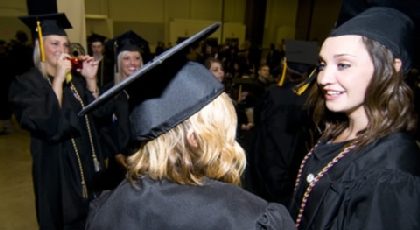Page 229 • (2,305 results in 0.182 seconds)
-
research lab to the clinic and to market.
-
approximately four participants. The drilling teams will trade off duties – one will be working, while the other is building relationships with the village members and playing games with the children. The hygiene team will be working with a hygiene coordinator and leading discussions and educational sessions to help build awareness, skills and behavior change in the area of hygiene and sanitation. Given the topic areas covered and some cultural sensitivities, the nonprofit requires that the hygiene team is
-
253.535.7132 www.plu.edu/history/ hist@plu.edu Rebekah Mergenthal, Ph.D., Chair History students at Pacific Lutheran University develop the skills needed to ask important questions, collect and evaluate evidence, work collaboratively with others, and offer clear and evidence-based explanations of past events and phenomena. Through research and writing projects, internships, lively discussions, class presentations and other opportunities, students build their confidence as poised critical
-
communities and in yeast cells. While Nile Red is effective, it is also an expensive dye and not easily synthesized in lab. Through the use of fluorescent microscope techniques, an alternate and less expensive dye has been identified to also fluorescently mark lipid droplets in yeast cells. Tetrazole stains when co-stained with Nile Red, localized in the same area, indicating that tetrazole also stains lipid droplets. 2:55 pm - Optimizing Methods for Analyzing O-GlcNAc Modifications Marisol Navarro
-
posting appropriate hazard signs on the door. The signs shall include the name and phone number of the investigator, faculty member, or laboratory director responsible for the activities of each lab. Training laboratory personnel in appropriate work practices and emergency procedures. Making sure containment and control facilities are adequate for the proposed research. Labeling, storing, and using hazardous agents in compliance with local, state, and federal regulations and university policy
-
. Twenty-six institutions across the United States received the top grade. PLU was among them. Only one other independent institution in the West was so honored. Educating students for lives of service also means giving students the opportunity to develop their leadership capacity and skills. With that goal in mind, Dean of Student Development Eva Johnson and her staff have been working over the past decade to build a year-long program called the “Student Leadership Institute.” Last year our program
-
their respective job assignments. Employees who are not qualified persons must also be trained in and familiar with any electrically related safety practices not specifically addressed by WAC 296-46B but which are necessary for their safety. Qualified persons (i.e., those permitted to work on or near exposed energized parts) must, at a minimum, be trained in and familiar with the following: The skills and techniques necessary to distinguish exposed live parts from other parts of electric equipment
-

PLU gave me. This connection nurtured me and allowed me to find my passion. I eventually changed what I wanted to do with my life and I can thank everyone at PLU for helping me realize what I wanted to do. What’s next? Next year I am going to be attending the University of British Columbia where I will be pursuing my Ph.D. in molecular biology. The particular lab that I will be in focuses on how a cell can get what it needs from the environment and get rid of waste. When this process goes wrong
-
. Auman’s lab studying tree canopy microbiomes. Upon graduation, I moved to Milwaukee, Wisconsin to attend The Medical College of Wisconsin and completed my studies in 2014. From there, I attended residency at the University of Massachusetts in Worcester, MA. I served as chief resident in my final year primarily overseeing new physicians and leading the Emergency Medicine elective experience for physicians from other specialties. I have been working as an attending physician with Tacoma Emergency Care
-
Research Institute as well as with undergraduate research in Dr. Auman’s lab studying tree canopy microbiomes. Upon graduation, I moved to Milwaukee, Wisconsin to attend The Medical College of Wisconsin and completed my studies in 2014. From there, I attended residency at the University of Massachusetts in Worcester, MA. I served as chief resident in my final year primarily overseeing new physicians and leading the Emergency Medicine elective experience for physicians from other specialties. I have
Do you have any feedback for us? If so, feel free to use our Feedback Form.


